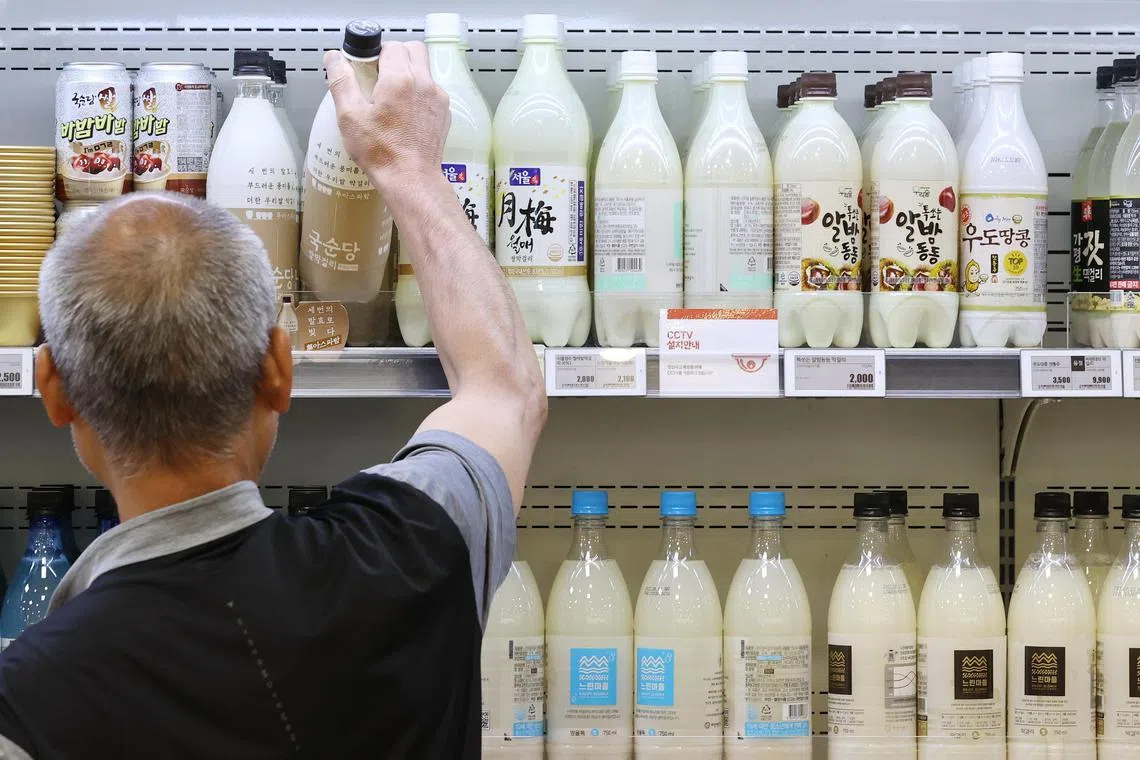Health effects of artificial sweetener aspartame unsettle South Korea’s makgeolli market
Sign up now: Get insights on Asia's fast-moving developments

Rising concerns among consumers have made makgeolli firms take pre-emptive measures.
PHOTO: EPA-EFE
Follow topic:
SEOUL - Reports that aspartame, a widely used artificial sweetener, could be reclassified as a possible carcinogen
Makgeolli, or Korean rice wine, is one of the most popular alcoholic drinks here. In 2021, the makgeolli market was estimated at around 510 billion won (S$528 million), with its exports reaching US$15.8 million (S$21 million), up 26.8 per cent from a year ago, according to data from the Food Information Statistics System.
“(Makgeolli makers) will take joint actions if aspartame becomes categorised as a carcinogen,” said an official from Seoul Jangsoo, which accounts for around 40 per cent of the makgeolli market.
“(We) will also consider making changes to our recipes to not use aspartame if needed,” the official added.
The response comes as the International Agency for Research on Cancer (IARC), the WHO’s cancer research arm, is expected to declare the artificial sweetener as a possible carcinogen on July 14.
Rising concerns among consumers have also made makgeolli firms take pre-emptive measures.
“I like drinking makgeolli, but I may shift to other drink options if the artificial sweetener is a carcinogen,” said a 36-year-old man surnamed Choi living in Seoul.
Despite the underlying concerns over aspartame, sales of makgeolli have remained steady.
Sales of makgeolli at CU convenience stores between July 1-3, right after reports on aspartame released, dropped by 3 per cent compared with a week ago, according to the CU chain store operator.
One industry source said sales have not been impacted much, “at least for now”, without the official ruling.
“But, it may hurt the industry from a long-term perspective if the WHO decides so,” the source said.
The source also raised concerns that the IARC ruling could mislead customers into thinking aspartame is relatively safer than other carcinogens.
According to the Ministry of Food and Drug Safety’s report in 2021, a 60kg adult would have to drink around 33 bottles of makgeolli for it to exceed the acceptable daily intake for aspartame. Another ministry report published in 2019 also said South Koreans’ daily aspartame intake remained at only 0.12 per cent of acceptable levels.
“(The country’s) aspartame intake remained at low levels before and is still low now,” a Food Ministry spokesman said on Monday.
“The ministry will consult experts and observe how other countries respond to the change if made.”
The IARC’s rulings do not always influence the South Korean government’s policymaking. When the IARC categorised processed meat as carcinogenic to humans (Group 1) and red meat as probably carcinogenic to humans (Group 2A) in 2015, the classification had not brought significant changes to the country’s food policies.
Aspartame is expected to be labelled as possibly carcinogenic to humans, under Group 2B, which includes aloe vera leaves and electromagnetic radiation, reports said.
Some have argued that classifying aspartame as a possible cancer risk can cause unnecessary confusion.
“Whether makgeolli has aspartame or not has not been much of a concern because the amount of aspartame that makgeolli has seems to be low and not as risky as other carcinogens that we take through meats and other foods,” said a regular makgeolli drinker who did not want to be named. THE KOREA HERALD/ASIA NEWS NETWORK

